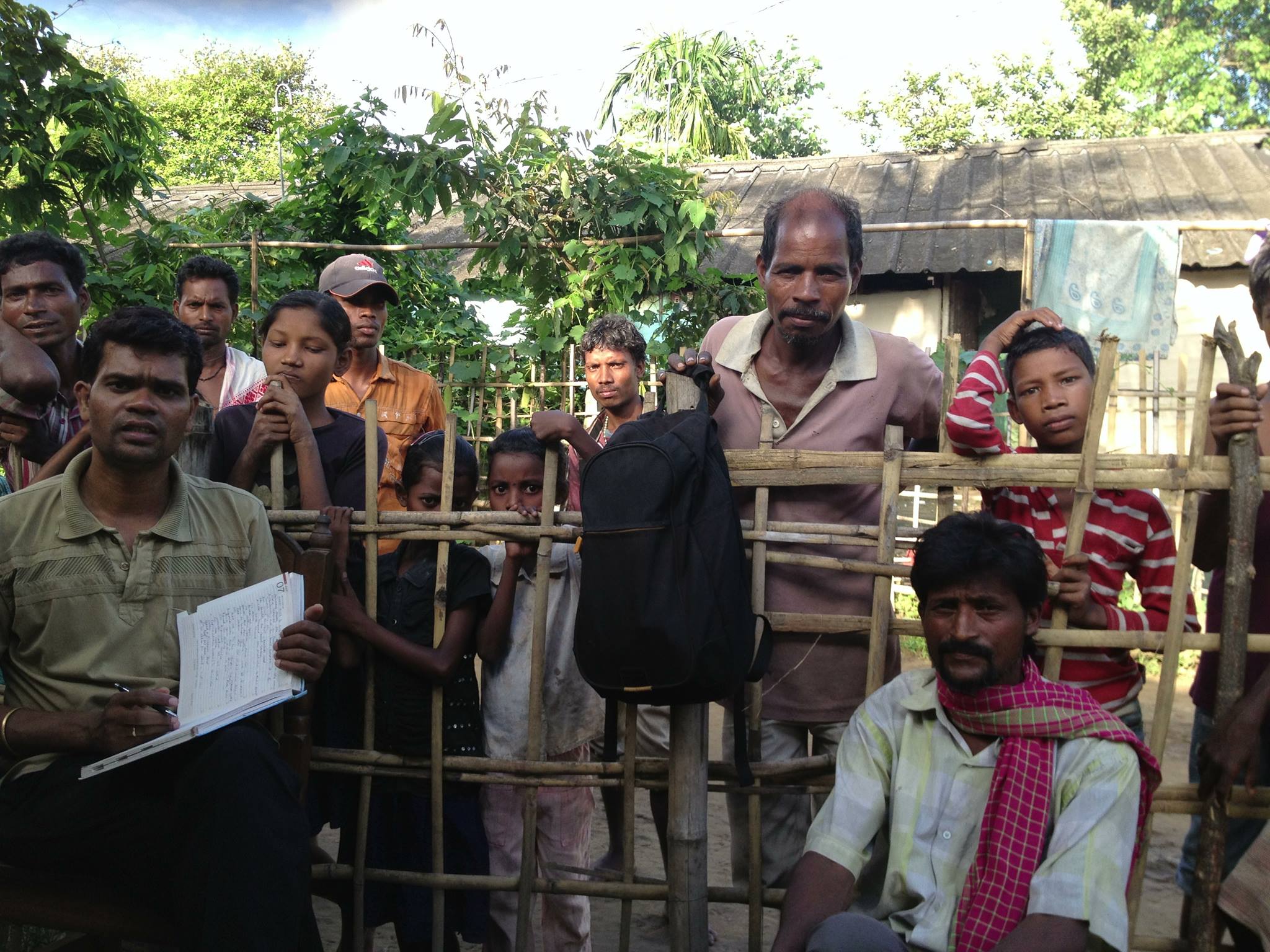By Francesca Feruglio
Background on Assam’s Tea Gardens and Nazdeek
The State of Assam, in North-East India, is home to more than half of India’s tea production and one sixth of the world’s production. However, thousands of tea garden workers living and working on the gardens have yet to benefit from such large-scale profit. Over 150 years ago Adivasi (indigenous) communities, were forcibly brought to Assam from India’s Central States to work as labourers in the gardens. Today, their living and working conditions remain shockingly poor, with the gardens lacking adequate essential services, such as hospitals, schools and food ration shops, and tea garden workers paid the lowest wage in India’s organized sector ($1.50/day).
Nazdeek, a legal capacity building organization committed to bringing access to justice closer to marginalized communities, has launched a project to build a community legal network for advancing socio-economic rights of tea garden workers. The project has been developed in partnership with PAJHRA, an Adivasi organization based in Assam, which in February 2013 filed a complaint with two other grassroots organizations at the World Bank’s Ombudsman service (Compliance Advisor Ombudsman, CAO). Nazdeek has been providing on-the-ground legal advice through the pendency of the complaint, which alleges serious violations of international and domestic law against Tata-Tetley’s subsidiary, Amalgamated Plantations Private Limited (APPL). Relevant laws include Plantation Labor Act (1951) and Rules (2010), International Covenant on Economic, Social and Cultural Rights, and World Bank Performance Standards.
Tata-Tetley is the second largest player in the global tea industry, and markets itself as a socially responsible leader. The complaint exposes how Tata-Tetley is fooling customers and making large profits from the mistreatment and exploitation of marginalized indigenous communities.
The CAO Complaint
The complaint was filed by PAJHRA, PAD and DBSS against the International Finance Corporation (IFC), a branch of the World Bank, which owns a share of 20% in 24 Tata-Tetley plantations in Assam and West Bengal. With little or no access to the local justice system, the World Bank’s complaint process seemed an avenue worth exploring to pressure Tata to adhere to labor laws and fundamental rights.
The complaint exposes violations of fundamental rights and labor rights in three plantations (Hattigor, Majuli and Naharoni), citing long working hours, inadequate compensation, poor hygiene and health conditions, degrading treatment and abuses by management, and restricted freedom of association. The complaint also raises the issue on the share-buy program financed by IFC, reporting that workers have been intimidated and pressured into buying shares by both the company and the local union, and did not receive adequate information on the shareholder program.
As to the procedure, once CAO finds the complaint eligible, an initial assessment takes place. This generally involves a team of experts visiting the affected area. Based on an email correspondance with CAO, the team also meets “relevant parties to understand the issues and determine whether and how they may be able to resolve the complaint.” The assessment stage, and the findings contained in the final report lead to two potential avenues: dispute resolution or compliance appraisal. In the former case, CAO facilitates negotiation between company and complainants for settling the dispute. When conditions for dispute resolution are not met or one or both parties do not want to pursue it, the case is referred to CAO Compliance, which is a separate team within CAO. After deciding on the merits of the case, the Compliance team may undertake an audit into IFC’s adherence to its mandatory safeguards and issue recommendations.
The assessment procedure proved to be challenging for the workers and complainants due to structural flaws within the complaint procedure and hurdles in its implementation. Rigid power dynamics within the gardens, which pervade all aspects of workers’ lives, made it difficult for workers to freely voice their concerns to the CAO team. CAO accepted the request to conceal complainants’ and workers names to management. However, it underestimated the power that management exerts on workers and, at times, did not grasp the challenges workers faced to attend the meetings without being intimidated and harassed. In fact, following CAO visits (the first one held in April, the second one in June/July) workers have been heavily questioned, threatened and in some cases retaliated by the management for voicing their concerns.
After these incidents, on July 3, 2013 CAO convened a joint meeting between the parties to discuss the issues of harassment and retaliation and to identify ground rules for interaction between management, complainant NGOs and workers. While the complainants argued for the need to ensure workers could speak freely, the company did not recognize the role of complainant NGOs as workers’ representatives. The dialogue eventually came to a dead end following a press release issued by the two organizations advising the complainants (Accountability Counsel and Nazdeek), which Tata-Tetley criticized as an unequivocal sign that the NGOs were not acting in “good faith.” Tata-Tetley sought to prove its own good faith by offering to discuss with workers without their representatives, an unacceptable option for workers considering the power dynamics inherent in the gardens.
As of November 2013, the assessment phase is completed and the report due to be finalized in November. With the path to dispute resolution irremediably blocked, the case is likely to turn to Compliance.
What lies ahead
The outcomes of the compliance procedure will be shaped by a series of variables.
First, CAO is not bound to share the draft assessment report with the parties. While it has done so in this case, CAO has no obligation to include all points discussed with the parties, thus potentially allowing for an incomplete and one-sided representation of the facts.
Secondly, as CAO’s mandate is limited to assessing IFC adherence with its own standards, the compliance procedure will exclusively focus on IFC – and not on Tata-Tetley. While IFC holds an important share within the company, it has only a limited control over management’s actions. Furthermore, findings from CAO compliance investigation have been disregarded in the past or even rejected by IFC, with a recent example of this worrisome behavior coming from another IFC-sponsored project in India.
Finally, a question remains open as to how the case will be dealt with in light of another previous complaint filed by the International Union of Food Workers in 2012 on the same IFC project, which covers some of the same issues (health and safety).
Beyond the CAO process
Whatever the final outcome may be, the complaint procedure has already made an impact on tea workers’ lives. Engaging with NGOs and the CAO team, workers have become more aware of their rights and more vocal in demanding them. This has led to increased mobilization, with workers initiating a dharna (public protest) in Hattigor and Majuli and submitting a charter of demands to the company calling for, inter alia, a change in doctor and managerial supervision. Both of these demands were met with a new physician brought to the gardens and the deputy manager shifted.
These wins, however small, have increased workers’ confidence, completely absent in a community that has been silenced for so many years. In light of this new turn, the NGOs are now looking into ways to support workers’ mobilization and engagement with civil society, especially student organizations within the gardens. One of the complainants has also become involved in a working group launched by the Indian Government’s National Advisory Council (NAC) to examine issues within plantations in the country.
The fight for justice in the gardens is just beginning.
For more information on Nazdeek’s Tea Garden Project. http://nazdeek.org/?page_id=100 LikeNazdeek’s Facebook page: https://www.facebook.com/nazdeek?bookmark_t=page








Good Luck to all parties involved
Dear
Sir or mam,
Hattigor tea estate worker’s why going to other estate. ….because of money ….
That is u not offer them….
Thanks and Regards